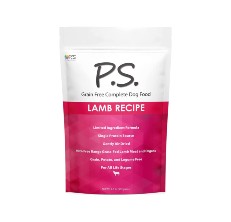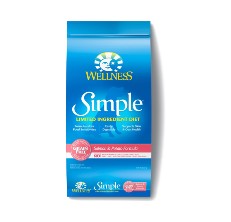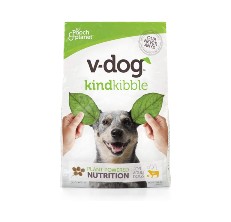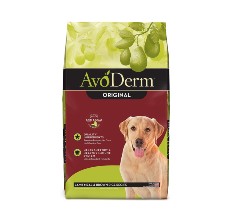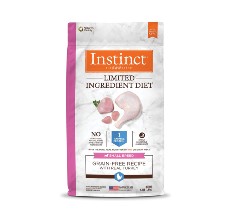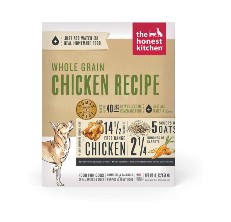- Home
- Gear Categories

Symptom-Free Nutrition: The Best Hypoallergenic Dog Food
Written by Jarett Gilpin
Last updated: Jun 24, 2024, 12:30 PM
Affiliate disclosure (read)

If your dog gets itchy or experiences digestive issues such as diarrhea or vomiting and even aggression every time you give it a particular food, it’s most likely allergic to it. Thankfully, anaphylactic reactions are rare in dogs, still, precautions have to be taken. That’s why we have compiled the best food for dogs with allergies in 2024 to keep your pet from suffering awful allergic reactions. Like humans, dog food allergies are genetic, so your dog was probably born with it. They are also the most common type of allergies experienced by canines. These allergies become triggered when your dog gets exposed to food that triggers it. Allergic reactions can happen after prolonged exposure to the food, or immediately. Here are some foods that could trigger an allergic reaction in your dog: soy or gluten, chicken egg, lamb, beef, and lamb. Dogs are most allergic to foods that contain protein or dairy products. We have thoroughly reviewed our list of best dog food for allergies not just for allergies, but taste. This way, you are not just protecting your pet from food allergies; you are giving it foods that it will love. These are our picks!
Our Top Picks for the Best Hypoallergenic Dog Food of 2024
- PS for Dogs Hypoallergenic Dog Food: Top Pick (shop now)Read more about this ↓
- Wellness Limited Ingredient Dog Food: Runner Up (shop now)Read more about this ↓
- V-Dog Vegan Kibble Dry Food: Honorable Mention (shop now)Read more about this ↓
- AvoDerm Natural Dry Dog Food: Also Consider (shop now)Read more about this ↓
- Instinct Limited Ingredient Dog Food: (shop now)Read more about this ↓
- Honest Kitchen Whole Grain Dog Food: (shop now)Read more about this ↓
PS for Dogs Hypoallergenic Dog Food
Top PickIf you are looking for a natural solution to your pet’s allergic reaction, PS for dogs will do the trick. It’s also perfect if your dog is a picky eater or fussy about its food. It’s also super addictive, so your dog can get used to it in no time. PS for dogs is grain-free and high in protein (but not the kinds that will harm your dog). It’s also air-dried and comes in irresistible pieces of meat that doubles as food and the perfect treat for your canine baby.
Wellness Limited Ingredient Dog Food
Runner UpIf your canine has a sensitive stomach, wellness simple natural limited dry dog food is the best dog food for it. It contains 25% protein, 12% fat and, as the name implies, is made from limited ingredients that provide a single protein source and easily digestible carbohydrate.
One great thing about this dog food is that it provides a range of food options that are specific to your pet’s needs. It’s got grained and grain-free options and high protein recipes. Depending on what your pet needs, you can choose from salmon, lamb, and duck-based recipes all rich in fatty acids.
V-Dog Vegan Kibble Dry Food
Honorable MentionIf your dog favors a vegan diet like you, V-Dog Vegan Kibble Dry Food will thrill the both of you. This dog food is 100% plant-based and is completely devoid of animal products, dairy, or fillers. It also contains taurine, which is perfect for dogs as they age and is used to support immune, brain, and eye health.
AvoDerm Natural Dry Dog Food
Also ConsiderAs health-conscious meals go, AvoDerm dry dog food can be described as the perfect blend. Made from a combination of avocado, brown rice, vegetables, and protein, AvoDerm ensures your pet gets a balanced meal. It is highly digestible, which makes it perfect if your pet has a sensitive stomach. It is also filled with ingredients that support your dog’s immune system, restore its coat and skin and promote healthy digestion.
Instinct Limited Ingredient Dog Food
Instinct Limited Ingredient Small Breed Dry Dog Food comes in four forms: wet, raw, dry, and pellet. Depending on what your canine friend needs, this provides a wide range of balanced options. There are also wet and dry dog food options. To reduce your dog’s allergies, its limited ingredients include 1 protein and 1grain (that’s one type of protein and one vegetable). Also, it doesn’t contain any dairy or protein such as egg, chicken, beef, fish, corn, chickpeas, soy, and wheat.
Honest Kitchen Whole Grain Dog Food
Made from free-range chicken and organic grains, The Honest Kitchen Human Grade Dehydrated Whole Grain Dog Food features a balanced combination of free-range chicken, organic oats, and bananas. Also, these ingredients are dehydrated to absorb all the nutrients your dog needs to stay healthy. It also promotes easy digestion for your pet. One thing you can be certain of is, this dog food was prepared with the highest safety standard. It’s human-grade, so the quality is like you’d expect from your food.
Buyer's Guide: Find the Right Food for Your Pup
Naturally, before buying dog food, you have to first determine whether your dog has allergies. Food allergies are quite common in dogs. It could be because of genetics or the environment. Any dog can have an allergic reaction. However, there are some dog breeds that are more likely to have allergic reactions than others. Some of them include bulldogs, pugs, pit bulls, Yorkies, labrador retrievers, german shepherds, golden retrievers, and cocker spaniels. If your pet is any of these, you have to be especially conscious about what you feed them.
In this section, we will answer all your questions about dog food allergies. Especially the important factors to consider before buying the best dog food for allergies for your canine friend.
What Are the Signs or Symptoms of a Dog Food Allergy?
There are many symptoms of a dog food allergy, but these three are the most common:
- Inflammatory Reaction: Often this comes as runny eyes, runny nose swelling of your pet’s face, eyelids, ears, or lips.
- Dermatological/Skin Reaction: You’ll know this when your dog gets itchy, is constantly licking its skin, or breaks out in hives. Of course, this could also be a reaction to flea bites, so you need to visit the vet to be certain.
- Digestive Reaction: This shows up as vomiting, excessive and persistent diarrhea, and overall indigestion.
Your dog could also show signs of an allergic reaction if it’s hyperactive, losing weight, losing its hair, is aggressive, or is too tired to do anything.
Once you notice any of these symptoms, take your dog to a vet immediately.
Important Considerations
The Age of Your Dog
Dog food for allergies often has the age limit of the dog on the label. This is important and prevents you from making costly mistakes. Like buying dog food meant for a larger breed for your little dog. So, before you make a purchase, do your research and read the label carefully. There is dog food that is perfect for aging dogs and not so great for little dogs.
For instance, a new puppy needs more protein. But as it ages, or gets into adulthood, you’d need to cut back so it doesn’t get overweight.
The breed of your dog
Dogs share many things in common, but not always their diet. The breed of your dog is a big determinant of what kind of dog food to get for it. Before placing an order, whether in person or online, specify your dog’s breed so that the seller can make recommendations for it. Those puppy dog eyes are very hard to resist but, don’t just by what you think your dog will like. You need to buy what’s healthy for it.
Your vet’s recommendation
Once your canine friend suffers a food allergy reaction, the first person to call is your vet. After treatment, your vet will give you recommendations on the kinds of food to feed your dog. Listen to those recommendations, they are very important.
Most times, when it’s not clear what a dog is allergic to, your vet will suggest an elimination diet. After that’s done, and the food allergy is determined, you can then make a decision on the best dog food for allergies.
The Type of Dog Food
- Grain-Free Dog Food: This type of dog food is specifically for dogs with stomach sensitivity. So, if you’ve determined that your dog is allergic to grains like corn and rye, wheat, and barley, then go for grain-free dog foods. The entire point of grain-free dog food is that it’s gluten-free. So, definitely check the label for that before you buy.
- Prescription Dog Food: This becomes necessary when your dog is suffering from severe food allergy reactions. Prescription foods are quite expensive, but this sucks more for your dog because severe food allergy reactions are no joke. However, don’t just decide on your own to get prescription dog food for your pet. You need to consult your vet first.
- Limited Ingredient Dog Food: These are dog foods that have very limited ingredients in them. Often from one or two sources (usually protein and carbohydrate). Limited ingredient dog food reduces the number of allergens your pet could unknowingly consume.
- Hypoallergenic Dog Food/Treats: These are also made up of limited ingredients.
- Novel Ingredient Dog Food: Dogs are often allergic to protein. So, a novel ingredient in dog food involves introducing your dog to a protein its not eaten yet. This is done with the help of a vet. Novel ingredient dog foods are often centered around less known protein. So, this way, your dog is less allergic to it.
How Are Dog Food Allergies Treated?
Often, the best way to treat a dog food allergy is through a hypoallergenic diet. This is done from 8 to 12 weeks. Hypoallergenic dog foods have limited ingredients in them. As mentioned before, they only have one source of ingredients, and these are often made from less common proteins. The point of a hypoallergenic diet is to introduce your dog to a diet that it has not experienced before.
You can do this yourself by changing your dog’s diet. You can go to a pet food store and choose food that has a different protein source than what your dog is currently eating.
However, you should only do this if you have adequate knowledge about dog diets. That’s why it’s always best to consult a vet. They can examine your dog and tell you exactly what to do.
Another reason you should consult a vet is your canine friend may not be allergic to the food after all. It could be something in the environment. Either way, visiting a vet will tell you all you need to know.
We independently research, test, review, and recommend the best products-learn more about our process. If you buy something through our links, we may earn a commission.
